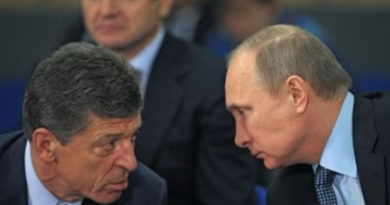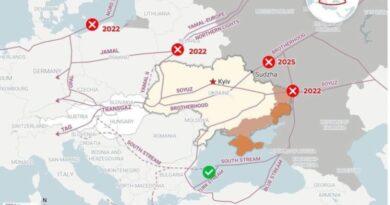Trump Faces Reality: A Hard Landing
As the world enters a new geopolitical phase, one event stands out as particularly significant: the moment Donald Trump is forced to confront reality. This reckoning is not merely political but also strategic, economic, and diplomatic. It is the moment that will puncture the bubble of his perceived omnipotence and messianic pretensions, exposing the internal contradictions within his policies.
Retreat on Tariffs
Trump has begun backtracking on one of his signature economic policies: tariffs. He has “paused” tariff hikes on Canada and Mexico—a move that signals a potential shift in strategy. This isn’t an act of generosity but a tacit acknowledgment of economic realities.
Forced to reckon with the fallout of his “act first, think later” trade wars, Trump’s promise of economic nationalism—bringing jobs back to America through tariffs—has faltered in several ways:
- U.S. industries reliant on imported materials have suffered.
- Consumers have borne the brunt of rising costs.
- Allies and trading partners have retaliated, undermining the competitiveness of American exports.
By slowing the escalation of tariffs, Trump quietly admits that his economic strategy hasn’t delivered the promised results.
The Musk Dilemma: A Lifeline Amid Administrative Chaos
Another glaring contradiction in Trump’s approach is his handling of Elon Musk’s growing unpopularity and questionable actions. Once an ally, Musk is increasingly becoming a liability due to his entanglement in international politics—including alleged meddling in elections in Germany and Romania. His mass layoffs and chaotic management of key institutions, including those tied to defense, intelligence, and infrastructure, have raised red flags.
Trump’s response? He is seeking Congressional approval to legitimize Musk’s firings—a move with dual aims:
- By involving Congress, Trump shields himself from accusations of mismanaging his administration and corporate allies.
- Politically, it’s damage control—Musk’s controversies risk tarnishing Trump’s standing with business leaders and international partners. By turning it into a legislative matter, Trump distances himself from direct accountability.
This tactic isn’t novel. Political leaders worldwide often use parliamentary decisions to deflect responsibility. Trump is now employing the same playbook.
Support Independent Analysis
Help us keep delivering free, unbiased, and in-depth insights by supporting our work. Your donation ensures we stay independent, transparent, and accessible to all. Join us in preserving thoughtful analysis—donate today!
The Russia Strategy: A Grand Plan in Ruins
Perhaps the most critical failure is Trump’s crumbling approach to strategic alignment with Russia. The idea was straightforward: by improving ties with Moscow, Trump hoped to reshape global power dynamics, particularly to counter China and divide world governance among Washington, Beijing, and Moscow. Yet this strategy has collapsed for several reasons:
- Putin demands results. The Russian leader treats Trump like a handler managing an asset, expecting tangible benefits—chiefly, pressuring Europe into a “peace” deal on Moscow’s terms.
- Europe resists capitulation. Instead of dividing and dominating the West, Trump has galvanized Europe against any deal that would weaken Ukraine. President Macron has hinted at doubts about U.S. support for Europe’s peace plan and signaled his readiness to act independently if necessary.
- Trump’s leadership credibility erodes. The image of Trump as “leader of the free world” has evaporated, making him less valuable to Putin.
- China gains leverage. Beijing has seized the opportunity to position itself as a key player in resolving Trump’s predicaments—without expending resources—while sending clear signals that Trump cannot win Russia over in the U.S.-China power struggle.
This failure marks a turning point: rather than reshaping the global order in his favor, Trump is empowering China and deepening the West’s crisis, emboldening America’s adversaries.
What Does the U.S. Want—Help Russia Sell Energy or Boost American Gas in Europe?
One of Trump’s starkest policy contradictions lies in his approach to energy. His administration has made no serious effort to ramp up exports of American liquefied natural gas (LNG) to Europe, despite Ursula von der Leyen proposing it as a step the EU would welcome. Such a move would align with Trump’s stated goals of boosting America’s shale industry and reducing Europe’s reliance on Russian energy.
Instead, Trump’s emissaries are actively aiding Russia’s re-entry into Europe’s gas market—including discussions about reviving the Nord Stream 2 pipeline and offering brokerage services for Russian energy sales to Europe. This raises critical questions:
- How does supporting Russian gas exports align with Trump’s “America First” energy policy?
- Why is the U.S. administration indirectly undermining its own energy producers?
- If energy independence is a pillar of national security, why is Trump bolstering Russia instead of strengthening U.S. energy dominance?
The result is absurd: the EU, which anticipated more American gas, has been forced by Trump’s actions to delay its roadmap for phasing out Russian gas. It’s almost too ridiculous to admit that Washington and Moscow might be coordinating energy pressure on Europe—with Trump’s team helping Russia gain market share at the expense of American producers. Ironically, Europe seems more invested in protecting the interests of U.S. shale companies than the American president.
Chaos, Isolation, and a Fading Superpower
A lack of coherent strategy and reliance on short-term improvisation now define Trump’s foreign policy. This unpredictability will yield two major consequences:
- Political isolation: The U.S. risks becoming an unreliable and politically toxic partner as allies struggle to navigate the chaos, limit the damage, and safeguard American corporate interests for the sake of long-term partnership.
- Loss of global influence: Trump’s actions directly erode trust in America, achieving the opposite of his stated goal: instead of “making America great again,” he’s accelerating its decline.
Lessons for Europe: Self-Reliance Is the Only Guarantee
For Europe, the key takeaway remains unchanged: whether it’s military, energy, or resource security, self-sufficiency is the only safeguard against external manipulation. Given that American democracy has produced such a president and such policies, this cannot be dismissed as a short-term anomaly.
This raises urgent questions for Europe’s self-proclaimed “titans” of green policy, who championed the green transition as the ultimate solution:
- Why did they push to halt oil, gas, and other resource exploration in Europe in pursuit of shortsighted environmental goals?
- How did they allow Europe to become so vulnerable to geopolitical blackmail?
The answers to these questions will shape Europe’s future security and independence—ensuring it can carry the torch of Western civilization and democratic values as the U.S. grapples with the long-term fallout of Trump’s legacy.
Ilian Vassilev




